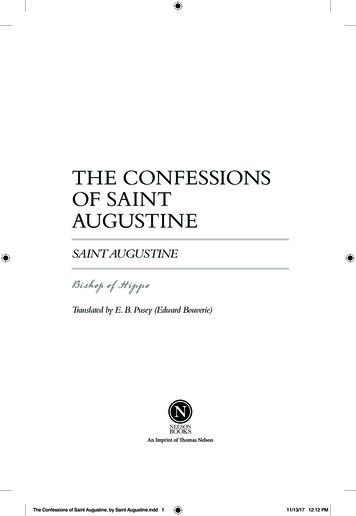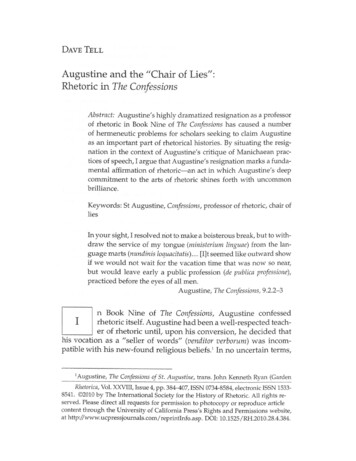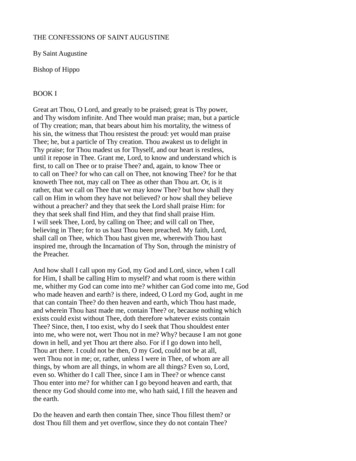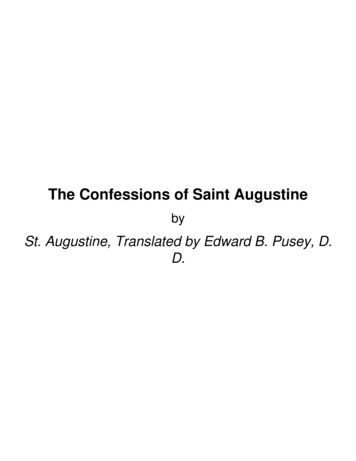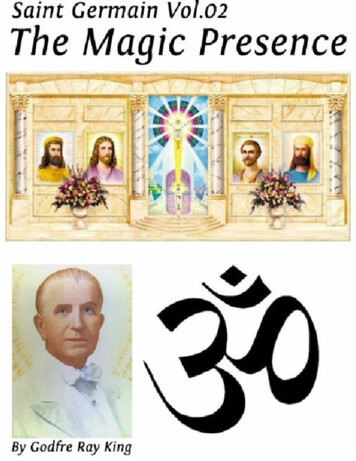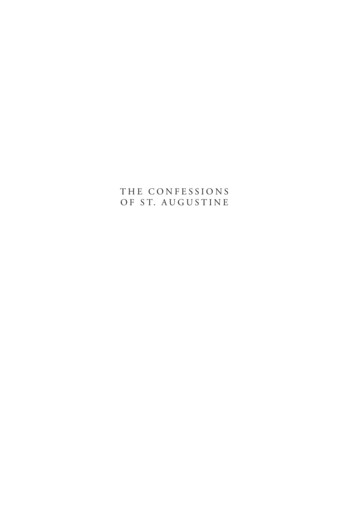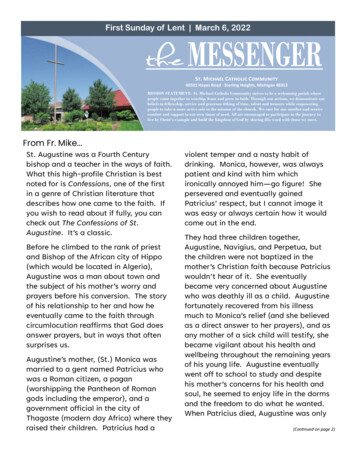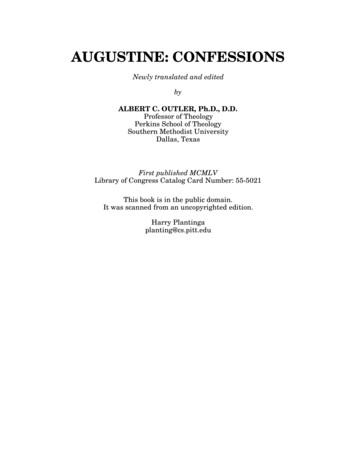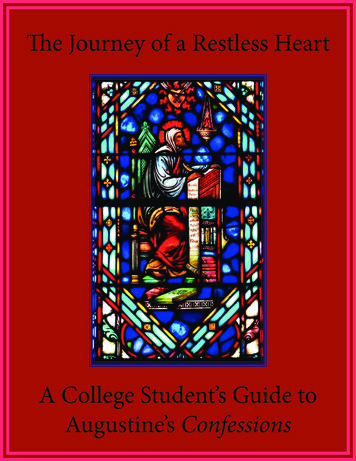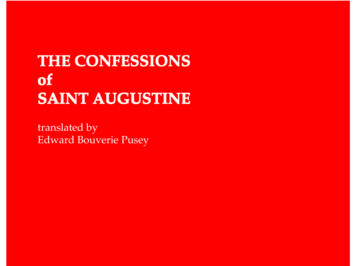
Transcription
THE CONFESSIONSofSAINT AUGUSTINEtranslated byEdward Bouverie Pusey
BOOK I: - - - - - - 3BOOK II: - - - - - - 13BOOK III: - - - - - 19BOOK IV: - - - - - 27BOOK V: - - - - - - 37BOOK VI: - - - - - 47BOOK VII:- - - - - 58BOOK VIII: - - - - 70BOOK IX: - - - - - 82BOOK X: - - - - - - 95BOOK XI: - - - - - 118BOOK XII:- - - - - 131BOOK XIII: - - - - 1462
THE CONFESSIONS OF SAINT AUGUSTINEBOOK I:Confessions of the greatness and unsearchableness of God, ofGod’s mercies in infancy and boyhood, and human wilfulness; ofhis own sins of idleness, abuse of his studies, and of God’s gifts upto his fifteenth year.- Great art Thou, O Lord, and greatly to be praised; great is Thypower, and Thy wisdom infinite. And Thee would man praise;man, but a particle of Thy creation; man, that bears about him hismortality, the witness of his sin, the witness that Thou resistest theproud: yet would man praise Thee; he, but a particle of Thy creation. Thou awakest us to delight in Thy praise; for Thou madestus for Thyself, and our heart is restless, until it repose in Thee.Grant me, Lord, to know and understand which is first, to call onThee or to praise Thee? and, again, to know Thee or to call onThee? for who can call on Thee, not knowing Thee? for he thatknoweth Thee not, may call on Thee as other than Thou art. Or, isit rather, that we call on Thee that we may know Thee? but howshall they call on Him in whom they have not believed? or howshall they believe without a preacher? and they that seek the Lordshall praise Him: for they that seek shall find Him, and they thatfind shall praise Him. I will seek Thee, Lord, by calling on Thee;and will call on Thee, believing in Thee; for to us hast Thou beenpreached. My faith, Lord, shall call on Thee, which Thou hastgiven me, wherewith Thou hast inspired me, through the Incarnation of Thy Son, through the ministry of the Preacher.And how shall I call upon my God, my God and Lord, since,when I call for Him, I shall be calling Him to myself? and whatroom is there within me, whither my God can come into me?whither can God come into me, God who made heaven and earth?is there, indeed, O Lord my God, aught in me that can containThee? do then heaven and earth, which Thou hast made, andBOOK I:wherein Thou hast made me, contain Thee? or, because nothingwhich exists could exist without Thee, doth therefore whateverexists contain Thee? Since, then, I too exist, why do I seek thatThou shouldest enter into me, who were not, wert Thou not inme? Why? because I am not gone down in hell, and yet Thou artthere also. For if I go down into hell, Thou art there. I could notbe then, O my God, could not be at all, wert Thou not in me; or,rather, unless I were in Thee, of whom are all things, by whom areall things, in whom are all things? Even so, Lord, even so.Whither do I call Thee, since I am in Thee? or whence canst Thouenter into me? for whither can I go beyond heaven and earth, thatthence my God should come into me, who hath said, I fill theheaven and the earth.Do the heaven and earth then contain Thee, since Thou fillestthem? or dost Thou fill them and yet overflow, since they do notcontain Thee? And whither, when the heaven and the earth arefilled, pourest Thou forth the remainder of Thyself? or hast Thouno need that aught contain Thee, who containest all things, sincewhat Thou fillest Thou fillest by containing it? for the vesselswhich Thou fillest uphold Thee not, since, though they were broken, Thou wert not poured out. And when Thou art poured out onus, Thou art not cast down, but Thou upliftest us; Thou art notdissipated, but Thou gatherest us. But Thou who fillest all things,fillest Thou them with Thy whole self? or, since all things cannotcontain Thee wholly, do they contain part of Thee? and all at oncethe same part? or each its own part, the greater more, the smallerless? And is, then one part of Thee greater, another less? or, artThou wholly every where, while nothing contains Thee wholly?What art Thou then, my God? what, but the Lord God? For who isLord but the Lord? or who is God save our God? Most highest,most good, most potent, most omnipotent; most merciful, yet3
THE CONFESSIONS OF SAINT AUGUSTINEmost just; most hidden, yet most present; most beautiful, yet moststrong, stable, yet incomprehensible; unchangeable, yet allchanging; never new, never old; all-renewing, and bringing ageupon the proud, and they know it not; ever working, ever at rest;still gathering, yet nothing lacking; supporting, filling, and overspreading; creating, nourishing, and maturing; seeking, yet having all things. Thou lovest, without passion; art jealous, withoutanxiety; repentest, yet grievest not; art angry, yet serene; changestThy works, Thy purpose unchanged; receivest again what Thoufindest, yet didst never lose; never in need, yet rejoicing in gains;never covetous, yet exacting usury. Thou receivest over andabove, that Thou mayest owe; and who hath aught that is notThine? Thou payest debts, owing nothing; remittest debts, losingnothing. And what had I now said, my God, my life, my holy joy?or what saith any man when he speaks of Thee? Yet woe to himthat speaketh not, since mute are even the most eloquent.Oh! that I might repose on Thee! Oh! that Thou wouldest enterinto my heart, and inebriate it, that I may forget my ills, andembrace Thee, my sole good! What art Thou to me? In Thy pity,teach me to utter it. Or what am I to Thee that Thou demandestmy love, and, if I give it not, art wroth with me, and threatenestme with grievous woes? Is it then a slight woe to love Thee not?Oh! for Thy mercies’ sake, tell me, O Lord my God, what Thouart unto me. Say unto my soul, I am thy salvation. So speak, that Imay hear. Behold, Lord, my heart is before Thee; open Thou theears thereof, and say unto my soul, I am thy salvation. After thisvoice let me haste, and take hold on Thee. Hide not Thy face fromme. Let me die- lest I die- only let me see Thy face.Narrow is the mansion of my soul; enlarge Thou it, that Thoumayest enter in. It is ruinous; repair Thou it. It has that withinwhich must offend Thine eyes; I confess and know it. But whoBOOK I:shall cleanse it? or to whom should I cry, save Thee? Lord,cleanse me from my secret faults, and spare Thy servant from thepower of the enemy. I believe, and therefore do I speak. Lord,Thou knowest. Have I not confessed against myself my transgressions unto Thee, and Thou, my God, hast forgiven the iniquity ofmy heart? I contend not in judgment with Thee, who art the truth;I fear to deceive myself; lest mine iniquity lie unto itself. Therefore I contend not in judgment with Thee; for if Thou, Lord,shouldest mark iniquities, O Lord, who shall abide it?Yet suffer me to speak unto Thy mercy, me, dust and ashes. Yetsuffer me to speak, since I speak to Thy mercy, and not to scornful man. Thou too, perhaps, despisest me, yet wilt Thou returnand have compassion upon me. For what would I say, O Lord myGod, but that I know not whence I came into this dying life (shallI call it?) or living death. Then immediately did the comforts ofThy compassion take me up, as I heard (for I remember it not)from the parents of my flesh, out of whose substance Thou didstsometime fashion me. Thus there received me the comforts ofwoman’s milk. For neither my mother nor my nurses stored theirown breasts for me; but Thou didst bestow the food of my infancythrough them, according to Thine ordinance, whereby Thou distributest Thy riches through the hidden springs of all things.Thou also gavest me to desire no more than Thou gavest; and tomy nurses willingly to give me what Thou gavest them. For they,with a heaven-taught affection, willingly gave me what theyabounded with from Thee. For this my good from them, was goodfor them. Nor, indeed, from them was it, but through them; forfrom Thee, O God, are all good things, and from my God is allmy health. This I since learned, Thou, through these Thy gifts,within me and without, proclaiming Thyself unto me. For then Iknew but to suck; to repose in what pleased, and cry at whatoffended my flesh; nothing more.4
THE CONFESSIONS OF SAINT AUGUSTINEAfterwards I began to smile; first in sleep, then waking: for so itwas told me of myself, and I believed it; for we see the like inother infants, though of myself I remember it not. Thus, little bylittle, I became conscious where I was; and to have a wish toexpress my wishes to those who could content them, and I couldnot; for the wishes were within me, and they without; nor couldthey by any sense of theirs enter within my spirit. So I flung aboutat random limbs and voice, making the few signs I could, andsuch as I could, like, though in truth very little like, what Iwished. And when I was not presently obeyed (my wishes beinghurtful or unintelligible), then I was indignant with my elders fornot submitting to me, with those owing me no service, for notserving me; and avenged myself on them by tears. Such have Ilearnt infants to be from observing them; and that I was myselfsuch, they, all unconscious, have shown me better than my nurseswho knew it.And, lo! my infancy died long since, and I live. But Thou, Lord,who for ever livest, and in whom nothing dies: for before thefoundation of the worlds, and before all that can be called“before,” Thou art, and art God and Lord of all which Thou hastcreated: in Thee abide, fixed for ever, the first causes of all thingsunabiding; and of all things changeable, the springs abide in Theeunchangeable: and in Thee live the eternal reasons of all thingsunreasoning and temporal. Say, Lord, to me, Thy suppliant; say,all-pitying, to me, Thy pitiable one; say, did my infancy succeedanother age of mine that died before it? was it that which I spentwithin my mother’s womb? for of that I have heard somewhat,and have myself seen women with child? and what before that lifeagain, O God my joy, was I any where or any body? For this haveI none to tell me, neither father nor mother, nor experience of others, nor mine own memory. Dost Thou mock me for asking this,BOOK I:and bid me praise Thee and acknowledge Thee, for that I doknow?I acknowledge Thee, Lord of heaven and earth, and praise Theefor my first rudiments of being, and my infancy, whereof Iremember nothing; for Thou hast appointed that man shouldfrom others guess much as to himself; and believe much on thestrength of weak females. Even then I had being and life, and (atmy infancy’s close) I could seek for signs whereby to makeknown to others my sensations. Whence could such a being be,save from Thee, Lord? Shall any be his own artificer? or can thereelsewhere be derived any vein, which may stream essence andlife into us, save from thee, O Lord, in whom essence and life areone? for Thou Thyself art supremely Essence and Life. For Thouart most high, and art not changed, neither in Thee doth to-daycome to a close; yet in Thee doth it come to a close; because allsuch things also are in Thee. For they had no way to pass away,unless Thou upheldest them. And since Thy years fail not, Thyyears are one to-day. How many of ours and our fathers’ yearshave flowed away through Thy “to-day,” and from it received themeasure and the mould of such being as they had; and still othersshall flow away, and so receive the mould of their degree ofbeing. But Thou art still the same, and all things of tomorrow,and all beyond, and all of yesterday, and all behind it, Thou hastdone to-day. What is it to me, though any comprehend not this?Let him also rejoice and say, What thing is this? Let him rejoiceeven thus! and be content rather by not discovering to discoverThee, than by discovering not to discover Thee.Hear, O God. Alas, for man’s sin! So saith man, and Thou pitiesthim; for Thou madest him, but sin in him Thou madest not. Whoremindeth me of the sins of my infancy? for in Thy sight none ispure from sin, not even the infant whose life is but a day upon the5
THE CONFESSIONS OF SAINT AUGUSTINEearth. Who remindeth me? doth not each little infant, in whom Isee what of myself I remember not? What then was my sin? was itthat I hung upon the breast and cried? for should I now so do forfood suitable to my age, justly should I be laughed at andreproved. What I then did was worthy reproof; but since I couldnot understand reproof, custom and reason forbade me to bereproved. For those habits, when grown, we root out and castaway. Now no man, though he prunes, wittingly casts away whatis good. Or was it then good, even for a while, to cry for what, ifgiven, would hurt? bitterly to resent, that persons free, and itsown elders, yea, the very authors of its birth, served it not? thatmany besides, wiser than it, obeyed not the nod of its good pleasure? to do its best to strike and hurt, because commands were notobeyed, which had been obeyed to its hurt? The weakness then ofinfant limbs, not its will, is its innocence. Myself have seen andknown even a baby envious; it could not speak, yet it turned paleand looked bitterly on its foster-brother. Who knows not this?Mothers and nurses tell you that they allay these things by I knownot what remedies. Is that too innocence, when the fountain ofmilk is flowing in rich abundance, not to endure one to share it,though in extremest need, and whose very life as yet dependsthereon? We bear gently with all this, not as being no or slightevils, but because they will disappear as years increase; for,though tolerated now, the very same tempers are utterly intolerable when found in riper years.Thou, then, O Lord my God, who gavest life to this my infancy,furnishing thus with senses (as we see) the frame Thou gavest,compacting its limbs, ornamenting its proportions, and, for itsgeneral good and safety, implanting in it all vital functions, Thoucommandest me to praise Thee in these things, to confess untoThee, and sing unto Thy name, Thou most Highest. For Thou artGod, Almighty and Good, even hadst Thou done nought but onlyBOOK I:this, which none could do but Thou: whose Unity is the mould ofall things; who out of Thy own fairness makest all things fair; andorderest all things by Thy law. This age then, Lord, whereof Ihave no remembrance, which I take on others’ word, and guessfrom other infants that I have passed, true though the guess be, Iam yet loth to count in this life of mine which I live in this world.For no less than that which I spent in my mother’s womb, is it hidfrom me in the shadows of forgetfulness. But if I was shapen ininiquity, and in sin did my mother conceive me, where, I beseechThee, O my God, where, Lord, or when, was I Thy servant guiltless? But, lo! that period I pass by; and what have I now to dowith that, of which I can recall no vestige?Passing hence from infancy, I came to boyhood, or rather it cameto me, displacing infancy. Nor did that depart,- (for whither wentit?)- and yet it was no more. For I was no longer a speechlessinfant, but a speaking boy. This I remember; and have sinceobserved how I learned to speak. It was not that my elders taughtme words (as, soon after, other learning) in any set method; but I,longing by cries and broken accents and various motions of mylimbs to express my thoughts, that so I might have my will, andyet unable to express all I willed, or to whom I willed, did myself,by the understanding which Thou, my God, gavest me, practisethe sounds in my memory. When they named any thing, and asthey spoke turned towards it, I saw and remembered that theycalled what they would point out by the name they uttered. Andthat they meant this thing and no other was plain from the motionof their body, the natural language, as it were, of all nations,expressed by the countenance, glances of the eye, gestures of thelimbs, and tones of the voice, indicating the affections of themind, as it pursues, possesses, rejects, or shuns. And thus by constantly hearing words, as they occurred in various sentences, Icollected gradually for what they stood; and having broken in my6
THE CONFESSIONS OF SAINT AUGUSTINEmouth to these signs, I thereby gave utterance to my will. Thus Iexchanged with those about me these current signs of our wills,and so launched deeper into the stormy intercourse of human life,yet depending on parental authority and the beck of elders.O God my God, what miseries and mockeries did I now experience, when obedience to my teachers was proposed to me, asproper in a boy, in order that in this world I might prosper, andexcel in tongue-science, which should serve to the “praise ofmen,” and to deceitful riches. Next I was put to school to getlearning, in which I (poor wretch) knew not what use there was;and yet, if idle in learning, I was beaten. For this was judged rightby our forefathers; and many, passing the same course before us,framed for us weary paths, through which we were fain to pass;multiplying toil and grief upon the sons of Adam. But, Lord, wefound that men called upon Thee, and we learnt from them tothink of Thee (according to our powers) as of some great One,who, though hidden from our senses, couldest hear and help us.For so I began, as a boy, to pray to Thee, my aid and refuge; andbroke the fetters of my tongue to call on Thee, praying Thee,though small, yet with no small earnestness, that I might not bebeaten at school. And when Thou heardest me not (not therebygiving me over to folly), my elders, yea my very parents, who yetwished me no ill, mocked my stripes, my then great and grievousill.Is there, Lord, any of soul so great, and cleaving to Thee with sointense affection (for a sort of stupidity will in a way do it); but isthere any one who, from cleaving devoutly to Thee, is enduedwith so great a spirit, that he can think as lightly of the racks andhooks and other torments (against which, throughout all lands,men call on Thee with extreme dread), mocking at those bywhom they are feared most bitterly, as our parents mocked theBOOK I:torments which we suffered in boyhood from our masters? For wefeared not our torments less; nor prayed we less to Thee to escapethem. And yet we sinned, in writing or reading or studying lessthan was exacted of us. For we wanted not, O Lord, memory orcapacity, whereof Thy will gave enough for our age; but our soledelight was play; and for this we were punished by those who yetthemselves were doing the like. But elder folks’ idleness is called“business”; that of boys, being really the same, is punished bythose elders; and none commiserates either boys or men. For willany of sound discretion approve of my being beaten as a boy,because, by playing a ball, I made less progress in studies which Iwas to learn, only that, as a man, I might play more unbeseemingly? and what else did he who beat me? who, if worsted insome trifling discussion with his fellow-tutor, was more embittered and jealous than I when beaten at ball by a play-fellow?And yet, I sinned herein, O Lord God, the Creator and Disposerof all things in nature, of sin the Disposer only, O Lord my God, Isinned in transgressing the commands of my parents and those ofmy masters. For what they, with whatever motive, would haveme learn, I might afterwards have put to good use. For I disobeyed, not from a better choice, but from love of play, lovingthe pride of victory in my contests, and to have my ears tickledwith lying fables, that they might itch the more; the same curiosity flashing from my eyes more and more, for the shows andgames of my elders. Yet those who give these shows are in suchesteem, that almost all wish the same for their children, and yetare very willing that they should be beaten, if those very gamesdetain them from the studies, whereby they would have themattain to be the givers of them. Look with pity, Lord, on thesethings, and deliver us who call upon Thee now; deliver those toowho call not on Thee yet, that they may call on Thee, and Thoumayest deliver them.7
THE CONFESSIONS OF SAINT AUGUSTINEAs a boy, then, I had already heard of an eternal life, promised usthrough the humility of the Lord our God stooping to our pride;and even from the womb of my mother, who greatly hoped inThee, I was sealed with the mark of His cross and salted with Hissalt. Thou sawest, Lord, how while yet a boy, being seized on atime with sudden oppression of the stomach, and like near todeath- Thou sawest, my God (for Thou wert my keeper), withwhat eagerness and what faith I sought, from the pious care of mymother and Thy Church, the mother of us all, the baptism of ThyChrist, my God and Lord. Whereupon the mother my flesh, beingmuch troubled (since, with a heart pure in Thy faith, she evenmore lovingly travailed in birth of my salvation), would in eagerhaste have provided for my consecration and cleansing by thehealth-giving sacraments, confessing Thee, Lord Jesus, for theremission of sins, unless I had suddenly recovered. And so, as if Imust needs be again polluted should I live, my cleansing wasdeferred, because the defilements of sin would, after that washing, bring greater and more perilous guilt. I then already believed:and my mother, and the whole household, except my father: yetdid not he prevail over the power of my mother’s piety in me, thatas he did not yet believe, so neither should I. For it was her earnest care that Thou my God, rather than he, shouldest be myfather; and in this Thou didst aid her to prevail over her husband,whom she, the better, obeyed, therein also obeying Thee, whohast so commanded.I beseech Thee, my God, I would fain know, if so Thou willest,for what purpose my baptism was then deferred? was it for mygood that the rein was laid loose, as it were, upon me, for me tosin? or was it not laid loose? If not, why does it still echo in ourears on all sides, “Let him alone, let him do as he will, for he isnot yet baptised?” but as to bodily health, no one says, “Let himbe worse wounded, for he is not yet healed.” How much betterBOOK I:then, had I been at once healed; and then, by my friends’ and myown, my soul’s recovered health had been kept safe in Thy keeping who gavest it. Better truly. But how many and great waves oftemptation seemed to hang over me after my boyhood! These mymother foresaw; and preferred to expose to them the clay whenceI might afterwards be moulded, than the very cast, when made.In boyhood itself, however (so much less dreaded for me thanyouth), I loved not study, and hated to be forced to it. Yet I wasforced; and this was well done towards me, but I did not well; for,unless forced, I had not learnt. But no one doth well against hiswill, even though what he doth, be well. Yet neither did they wellwho forced me, but what was well came to me from Thee, myGod. For they were regardless how I should employ what theyforced me to learn, except to satiate the insatiate desires of awealthy beggary, and a shameful glory. But Thou, by whom thevery hairs of our head are numbered, didst use for my good theerror of all who urged me to learn; and my own, who would notlearn, Thou didst use for my punishment- a fit penalty for one, sosmall a boy and so great a sinner. So by those who did not well,Thou didst well for me; and by my own sin Thou didst justly punish me. For Thou hast commanded, and so it is, that every inordinate affection should be its own punishment.But why did I so much hate the Greek, which I studied as a boy? Ido not yet fully know. For the Latin I loved; not what my firstmasters, but what the so-called grammarians taught me. For thosefirst lessons, reading, writing and arithmetic, I thought as great aburden and penalty as any Greek. And yet whence was this too,but from the sin and vanity of this life, because I was flesh, and abreath that passeth away and cometh not again? For those firstlessons were better certainly, because more certain; by them Iobtained, and still retain, the power of reading what I find writ-8
THE CONFESSIONS OF SAINT AUGUSTINEten, and myself writing what I will; whereas in the others, I wasforced to learn the wanderings of one Aeneas, forgetful of myown, and to weep for dead Dido, because she killed herself forlove; the while, with dry eyes, I endured my miserable self dyingamong these things, far from Thee, O God my life.For what more miserable than a miserable being who commiserates not himself; weeping the death of Dido for love to Aeneas,but weeping not his own death for want of love to Thee, O God.Thou light of my heart, Thou bread of my inmost soul, ThouPower who givest vigour to my mind, who quickenest mythoughts, I loved Thee not. I committed fornication against Thee,and all around me thus fornicating there echoed “Well done! welldone!” for the friendship of this world is fornication againstThee; and “Well done! well done!” echoes on till one is ashamednot to he thus a man. And for all this I wept not, I who wept forDido slain, and “seeking by the sword a stroke and woundextreme,” myself seeking the while a worse extreme, the extremest and lowest of Thy creatures, having forsaken Thee, earthpassing into the earth. And if forbid to read all this, I was grievedthat I might not read what grieved me. Madness like this isthought a higher and a richer learning, than that by which Ilearned to read and write.But now, my God, cry Thou aloud in my soul; and let Thy truthtell me, “Not so, not so. Far better was that first study.” For, lo, Iwould readily forget the wanderings of Aeneas and all the rest,rather than how to read and write. But over the entrance of theGrammar School is a vail drawn! true; yet is this not so much anemblem of aught recondite, as a cloak of error. Let not those,whom I no longer fear, cry out against me, while I confess toThee, my God, whatever my soul will, and acquiesce in the condemnation of my evil ways, that I may love Thy good ways. LetBOOK I:not either buyers or sellers of grammar-learning cry out againstme. For if I question them whether it be true that Aeneas came ona time to Carthage, as the poet tells, the less learned will reply thatthey know not, the more learned that he never did. But should Iask with what letters the name “Aeneas” is written, every onewho has learnt this will answer me aright, as to the signs whichmen have conventionally settled. If, again, I should ask whichmight be forgotten with least detriment to the concerns of life,reading and writing or these poetic fictions? who does not foreseewhat all must answer who have not wholly forgotten themselves?I sinned, then, when as a boy I preferred those empty to thosemore profitable studies, or rather loved the one and hated theother. “One and one, two”; “two and two, four”; this was to me ahateful singsong: “the wooden horse lined with armed men,” and“the burning of Troy,” and “Creusa’s shade and sad similitude,”were the choice spectacle of my vanity.Why then did I hate the Greek classics, which have the like tales?For Homer also curiously wove the like fictions, and is mostsweetlyvain, yet was he bitter to my boyish taste. And so I suppose would Virgil be to Grecian children, when forced to learnhim as I was Homer. Difficulty, in truth, the difficulty of a foreigntongue, dashed, as it were, with gall all the sweetness of Grecianfable. For not one word of it did I understand, and to make meunderstand I was urged vehemently with cruel threats and punishments. Time was also (as an infant) I knew no Latin; but this Ilearned without fear or suffering, by mere observation, amid thecaresses of my nursery and jests of friends, smiling and sportivelyencouraging me. This I learned without any pressure of punishment to urge me on, for my heart urged me to give birth to its conceptions, which I could only do by learning words not of thosewho taught, but of those who talked with me; in whose ears also Igave birth to the thoughts, whatever I conceived. No doubt, then,9
THE CONFESSIONS OF SAINT AUGUSTINEthat a free curiosity has more force in our learning these things,than a frightful enforcement. Only this enforcement restrains therovings of that freedom, through Thy laws, O my God, Thy laws,from the master’s cane to the martyr’s trials, being able to temperfor us a wholesome bitter, recalling us to Thyself from that deadlypleasure which lures us from Thee.Hear, Lord, my prayer; let not my soul faint under Thy discipline,nor let me faint in confessing unto Thee all Thy mercies, wherebyThou hast drawn me out of all my most evil ways, that Thoumightest become a delight to me above all the allurements whichI once pursued; that I may most entirely love Thee, and clasp Thyhand with all my affections, and Thou mayest yet rescue me fromevery temptation, even unto the end. For lo, O Lord, my King andmy God, for Thy service be whatever useful thing my childhoodlearned; for Thy service, that I speak, write, read, reckon. ForThou didst grant me Thy discipline, while I was learning vanities;and my sin of delighting in those vanities Thou hast forgiven. Inthem, indeed, I learnt many a useful word, but these may as wellbe learned in things not vain; and that is the safe path for the stepsof youth.But woe is thee, thou torrent of human custom! Who shall standagainst thee? how long shalt thou not be dried up? how long rollthe sons of Eve into that huge and hideous ocean, which eventhey scarcely overpass who climb the cross? Did not I read in theeof Jove the thunderer and the adulterer? both, doubtless, he couldnot be; but so the feigned thunder might countenance and panderto real adultery. And now which of our gowned masters lends asober ear to one who from their own school cries out, “Thesewere Homer’s fictions, transferring things human to the gods;would he had brought down things divine to us!” Yet more trulyhad he said, “These are indeed his fictions; but attributing aBOOK I:divine nature to wicked men, that crimes might be no longercrimes, and whoso commits them might seem to imitate not abandoned men, but the celestial gods.”And yet, thou hellish torrent, into thee are cast the sons of menwith rich rewards, for compassing such learning; and a greatsolemnity i
THE CONFESSIONS OF SAINT AUGUSTINE BOOK I: 3 BOOK I: Confessions of the greatness and unsearchableness of God, of God's mercies in infancy and boyhood, and human wilfulness; of his own sins of idleness, abuse of his studies, and of God's gifts up to his fifteenth year. - Great art Thou, O Lord, and greatly to be praised; great is Thy

